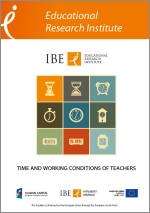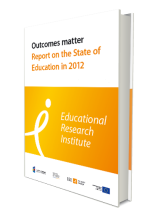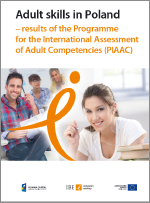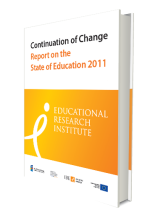Time And Working Conditions of Teachers - brochure
- Published on Monday, 19 May 2014 09:05
The brochure reports the summary findings on the Time And Working Conditions of Teachers study carried out by IBE within "Education Enthusiasts" project.
The goal of the study was to:
- identify time allocated by teachers within a typical timetabled school week to performance of work activities and factors for their variability;
- describe the complexity of teachers’ working day and highlight different approaches to the teaching profession.
Given the specific nature of teaching, work time measurements can only be based on declarations of respondents (a questionnaire filled in by teachers themselves or with the interviewer’s help, investigating an “average” week, the past week or the past day or two) and observations of their behaviour.
Download "Time And Working Conditions of Teachers - brochure" [pdf, 18MB]
Outcomes matter - Report on the State of - Education in 2012 - Information booklet
- Published on Thursday, 15 May 2014 11:10
This information brochure presents a summary of the third edition of the “Report on the Condition of Education”. We call it “Outcomes Matter”, because for several years, we have been transforming the education system into a model where learning outcomes constitute the fundamental criterion for assessing acquired qualifications in the areas of  knowledge, skills and social competence.
knowledge, skills and social competence.
These are not solely the outcomes of formal education, but also outcomes to be attained through non-formal or informal learning. These transformations are the main theme of the section entitled “Modernising the qualifi cations system in Poland to support the policy of lifelong learning”. It was the concept of lifelong learning that spurred the introduction of learning outcomes as the main criterion of the education system’s consistency and effectiveness.
Just like its previous editions, this report opens with an analysis of the changes occurring in education, as well as the legal changes in the formal general and vocational education system and higher education. It presents quantitative data on the educational infrastructure, the participation of children and youth in the education system, the relationship between educational attainment levels and transition to the labour market, and the financing of education on various levels. The brochure also contains an analysis and comments relating mainly to the specific underlying factors driving these trends to present a versatile picture of the condition of Polish education.
Naturally, this booklet does not include all the issues presented in the in-depth report. Therefore, I wholeheartedly encourage you to read this report, which is available at www.eduentuzjasci.pl.
Download: Outcomes matter - Report on the State of - Education in 2012 - Information booklet [pdf, 21 MB]
.Adult skills in Poland – results of the Programme for the International Assessment of Adult Competencies (PIAAC)
- Published on Thursday, 19 December 2013 12:00
Young Poles have similar competencies to their peers from 22 OECD countries. The results of the Programme for the International Assessment of Adult Competencies (PIAAC) show that over the past 17 years, the proficiency level of adult Poles has increased.
The infomation booklet presents major findings of the Programme for the International Assessment of Adult  competencies (PIAAC). The study, which was conducted in 2011-2012 in 24 countries, measured the competencies of adults in literacy, numeracy and problem solving in technology-rich environments. The assessment in Poland was coordinated by the Educational Research Institute.
competencies (PIAAC). The study, which was conducted in 2011-2012 in 24 countries, measured the competencies of adults in literacy, numeracy and problem solving in technology-rich environments. The assessment in Poland was coordinated by the Educational Research Institute.
The competencies measured by PIAAC are a prerequisite to function in the modern world and to attain new knowledge and skills. PIAAC provides information on, among other issues, the relationship between competencies, education and the labour market situation. The data obtained during the study enables an assessment of the quality of human capital resources. Based on this, an evaluation of the economic potential, social cohesion and identification of groups at risk of social exclusion due to their low level of skills are possible.
Download the information brochure: Adult skills in Poland – results of the Programme for the International Assessment of Adult Competencies (PIAAC) [pdf, 13,5MB]
Continuation of Change - Report on the State of Education 2011 - information booklet
- Published on Friday, 20 July 2012 16:52
“Continuation of Change” is the second report from a series of reports on the state of education prepared by the Educational Research Institute. The report contains a new regular part in which updated information on trends in education is collated from different sources accompanied by a chapter devoted to changes in law which were introduced in the year prior to the publication of this report – 2011.
Compared to 2010 report more attention was paid to vocational and higher education - it was a year of significant legislative changes in both areas. The end of school year 2011/2012 was followed by significant changes in vocational schools culminating in the introduction of the new, long-anticipated core curriculum for vocational education.
Changes in higher education were introduced on 1 October 2011 through the higher education act amendment of March 2011. Thanks to National Qualification Frameworks in Higher Education, which have been in preparation since 2006, universities have gained more autonomy in the development of their curricula. They can plan the courses they offer independently, determining the name and curriculum as well as the expected learning outcomes. These changes occur at a crucial moment for universities as they have to cope with the effects of population decline and consider their offer and strategies for development.
Download the information booklet:
- PDF [10MB] - Continuation of Change - Report on the State of Education 2011
- EPUB [1,7MB] - Continuation of Change - Report on the State of Education 2011







